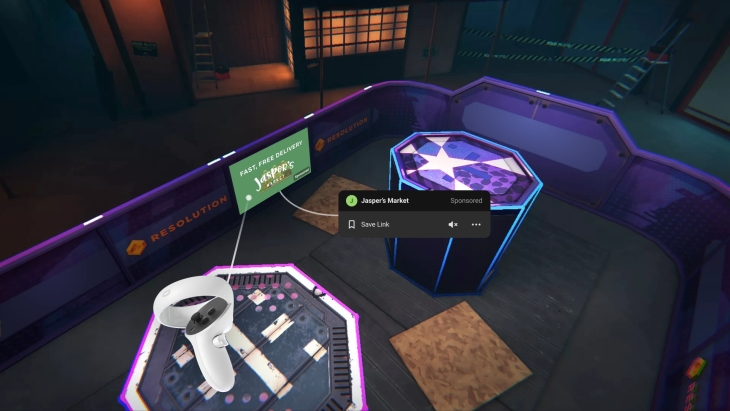
Facebook have announced they are testing in-game adverts for Oculus VR devices across a selection of titles.
Having already been tested on the Oculus mobile app last month, Facebook announced the next phase would involve “a small test of in-headset ads.” This would begin with Blaston by Resolution Games and “a couple other developers that will be rolling out over the coming weeks.”
While Facebook Reality Labs states their primary focus is to “bring more people into VR, advance the consumer experience, and make progress on our longer-term augmented reality initiatives;” they are also exploring new ways for developers to make revenue, a key part of creating a self-sustaining platform “that can support a variety of business models that unlock new types of content and audiences.”
More details on when the ads may become more broadly available will be revealed once feedback from developers and the community is received. “We’re eager to hear what you think, so please feel free to reach out to Oculus Support to share your feedback.”
“Ads are most effective when they’re high-quality and relevant—because of that, Oculus ads will follow Facebook’s advertising principles, the first of which is ‘build for people first.’ It’s also important that people can manage the ads they see, so we’re including controls to hide specific ads or hide ads from an advertiser completely. Users can also access more detailed Ad Preferences from any ad via our ‘Why am I seeing this ad?’ interface. As our tests progress, we’ll continue listening to feedback to improve the ads people see.”
These new adverts will not alter prior Facebook privacy or advertising policies. Data from the Oculus headset is not used to generate adverts, as “Processing and storing information on the device means it doesn’t leave your headset or reach Facebook servers.”
Facebook also state they are “currently investing in unobtrusive ads as a new way for developers to build businesses—and though we’re not quite ready to test them yet, we’re also exploring new ad formats that are unique to VR.” They concluded with how in-game ads could help usher in VR becoming mainstream.
“While this is an early test, we’re excited by the opportunity to open up new revenue streams for developers and as a result, broaden the type of apps and content on the Oculus platform. A more profitable content ecosystem is a critical step on the path to consumer VR becoming truly mainstream. And that’s something we think is worth celebrating.”
Last year, Admix announced they successfully raised $7 million USD for “non-intrusive” in-game advertising programs and technology.
This is not the first time in recent months Oculus have had controversial moves thanks to Facebook. Oculus previously announced that users would need to merge their account with a Facebook account from October 2020. Users were not happy, many accusing Facebook of inflating their user numbers via merging accounts (or users having to create new ones), and had concerns over the privacy of the social media platform.
Facebook also confirmed those who violate their Community Standards and have their account banned “may also lose access” to their Oculus games. These violations also included using a fake name or date of birth. Even so, Road to VR reported “the company says that users can choose a pseudonym to associate with their VR activities and maintain a list of VR friends that is separate from their Facebook friends.”
Later, some users were reportedly locked out of their brand new Oculus Quest 2 device for being banned from Facebook, and users having created a new Facebook just for playing Quest 2 being banned with 10 minutes or immediately disabled.
A tweet from Oculus Support stated “We’re aware a small number of customers are having trouble using Quest 2 with their Facebook accounts. If you’re one of the few who’s having trouble getting set up, we’re ready and available to help.” Facebook’s VP of Augmented and Virtual Reality recommended users “make sure their Facebook accounts are in good standing” before buying an Oculus Quest VR headset.
It was later discovered that if users deleted their linked Facebook account, their Oculus purchases were also deleted. Those who own the original Oculus Quest, Rift, Rift 2, and do not plan to link to their Facebook account will be fine. New Oculus headsets such as the Oculus Quest 2 require a Facebook log-in.
In-Game adverts in NBA 2K21 and EA Sports UFC 4 were met with condemnation from their respective communities, with the latter being removed after “feedback” showed it was not welcome.